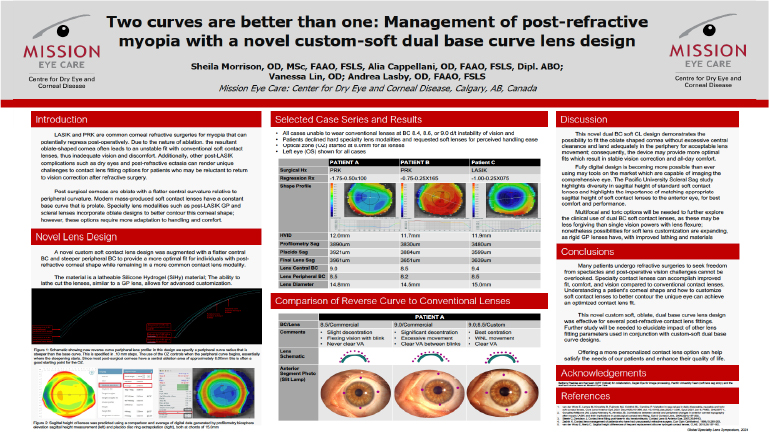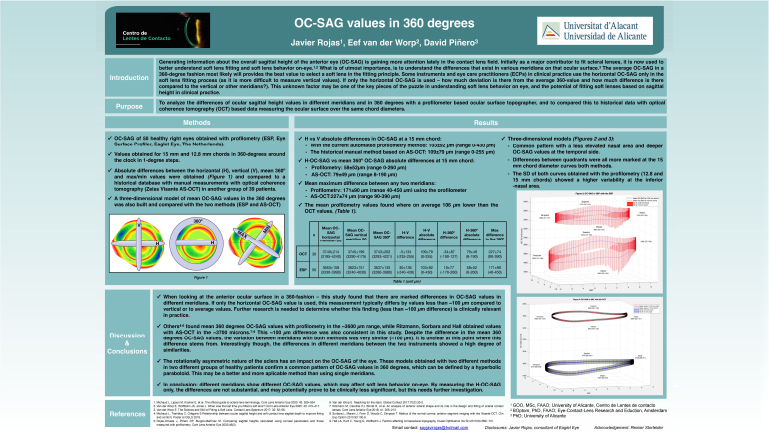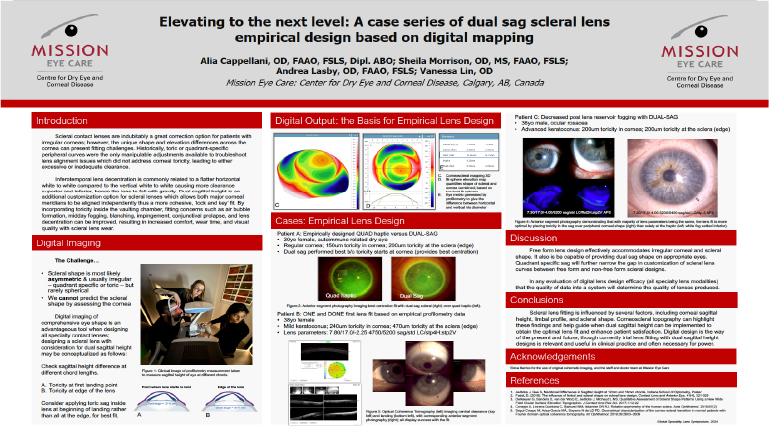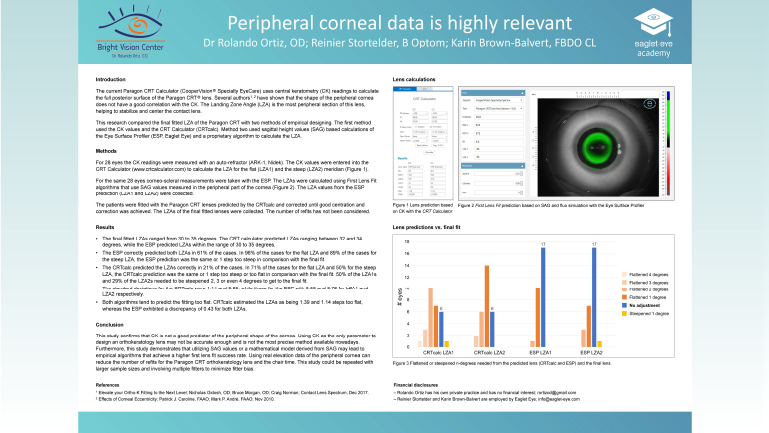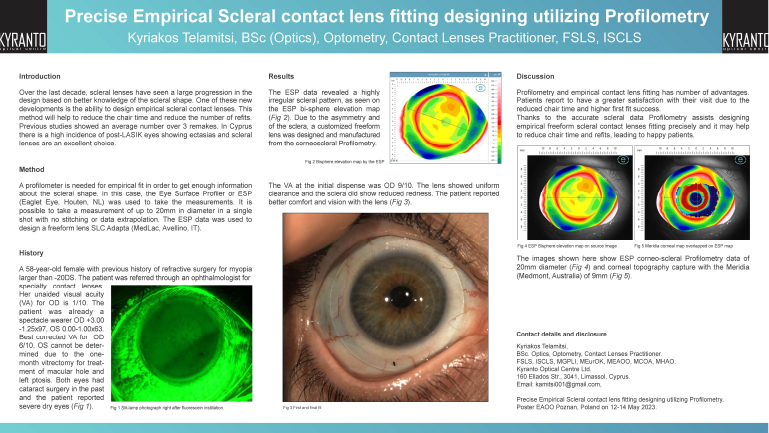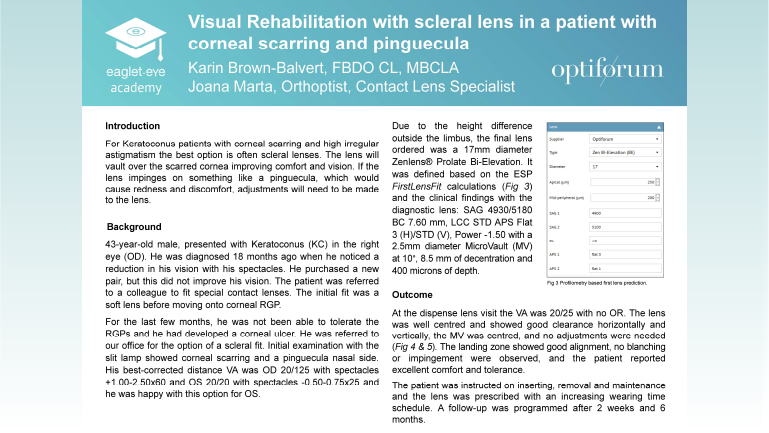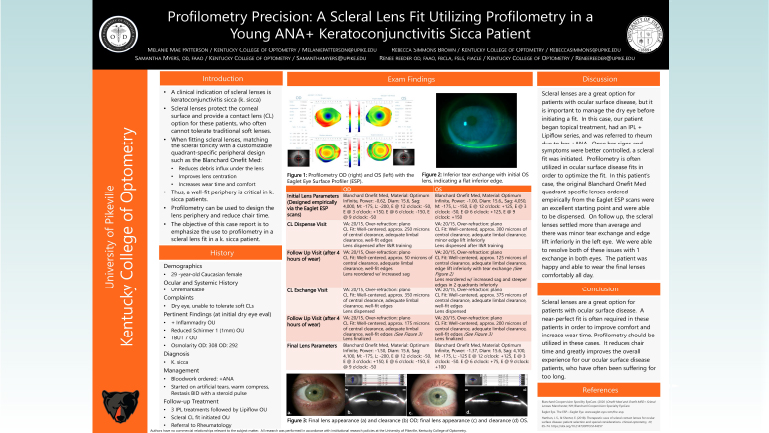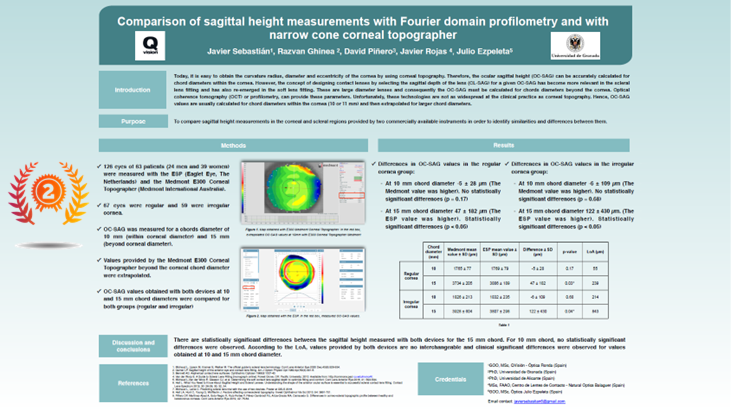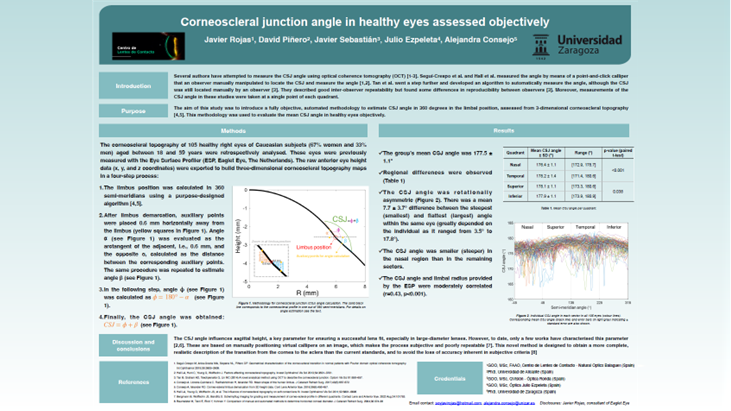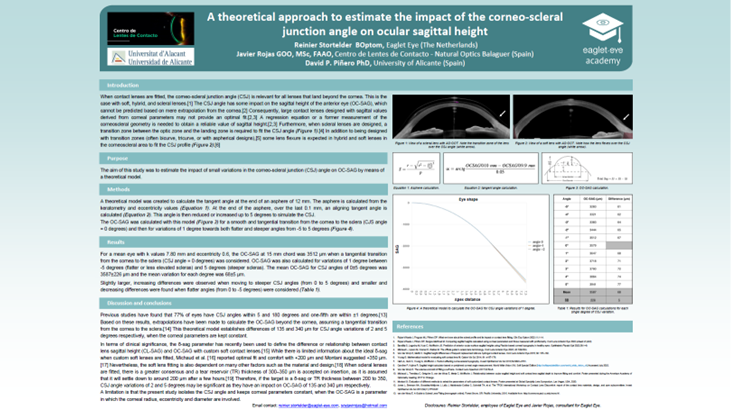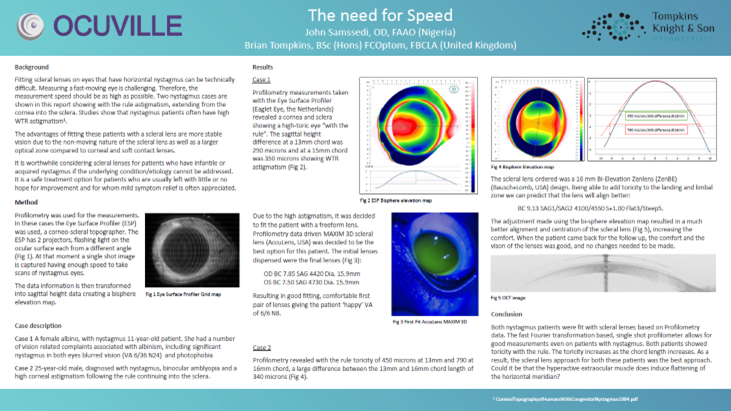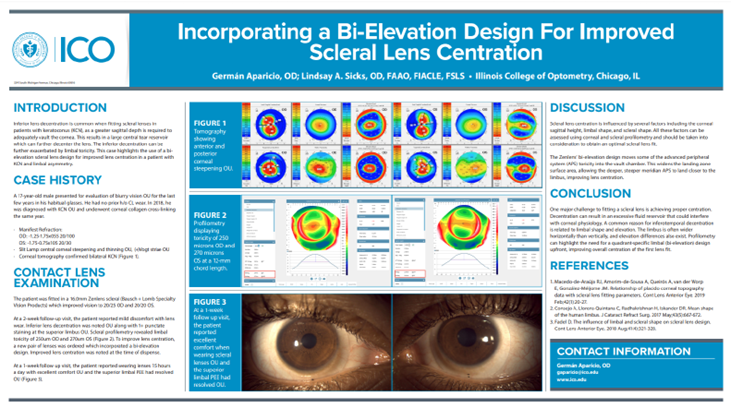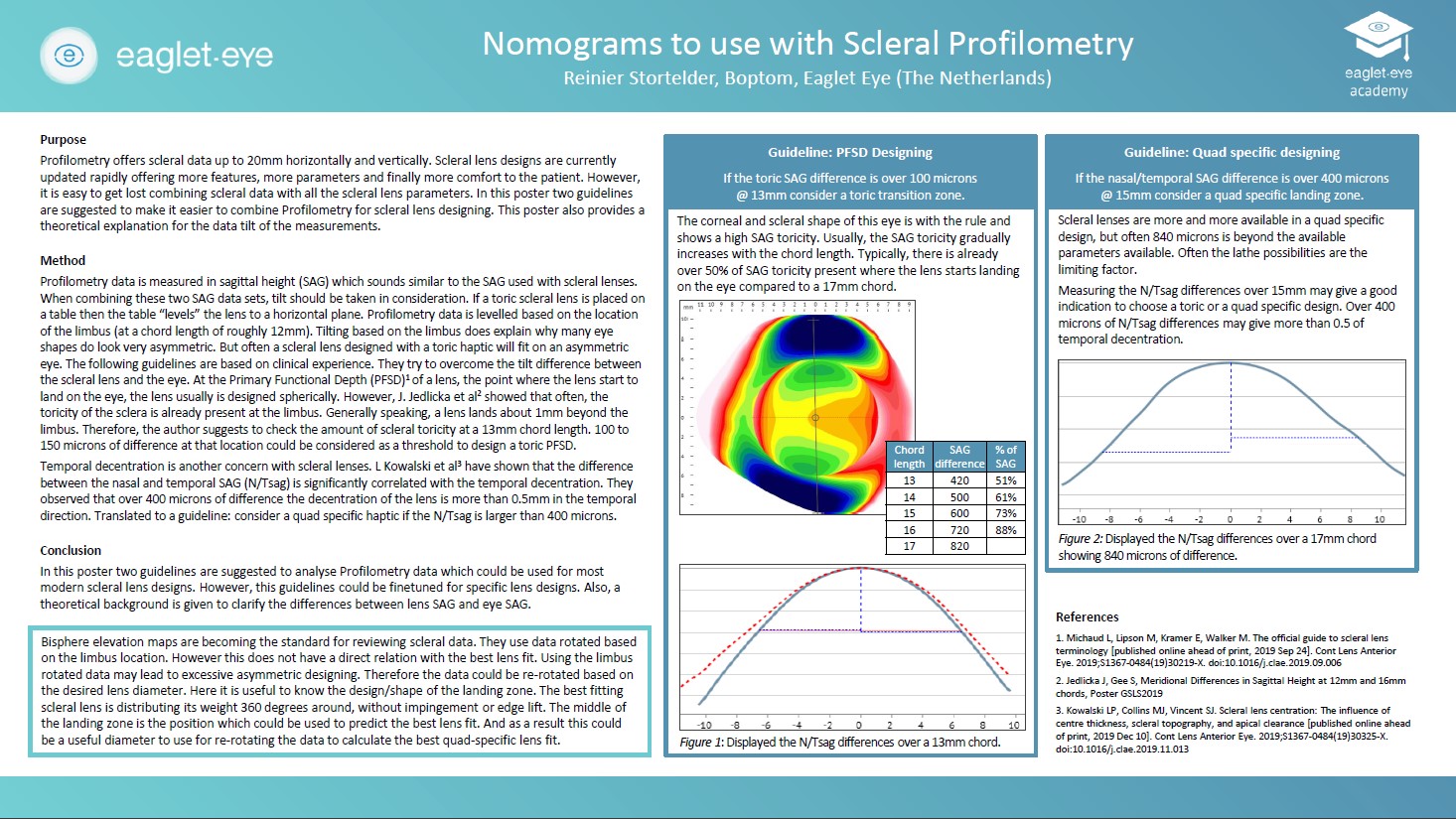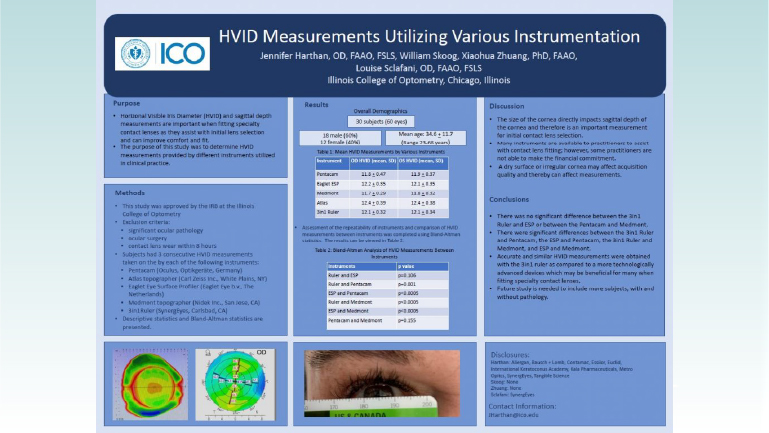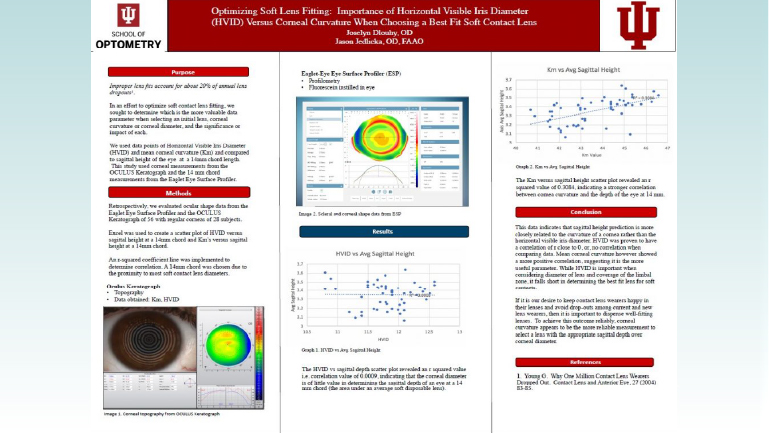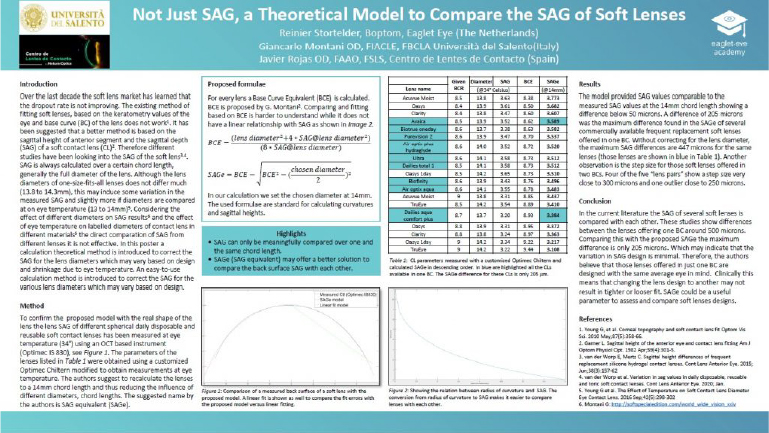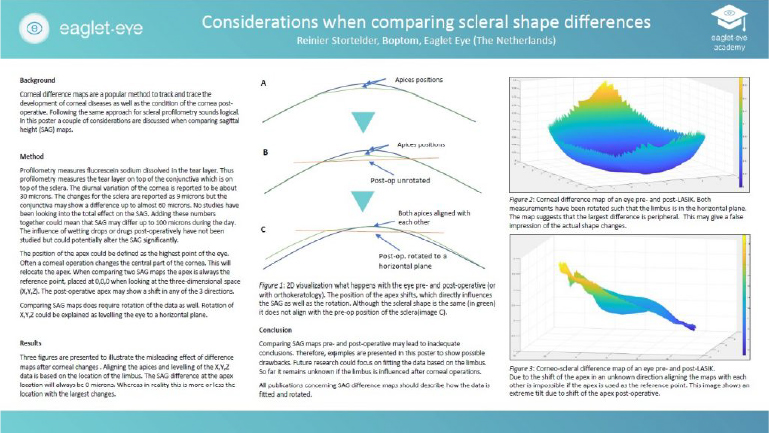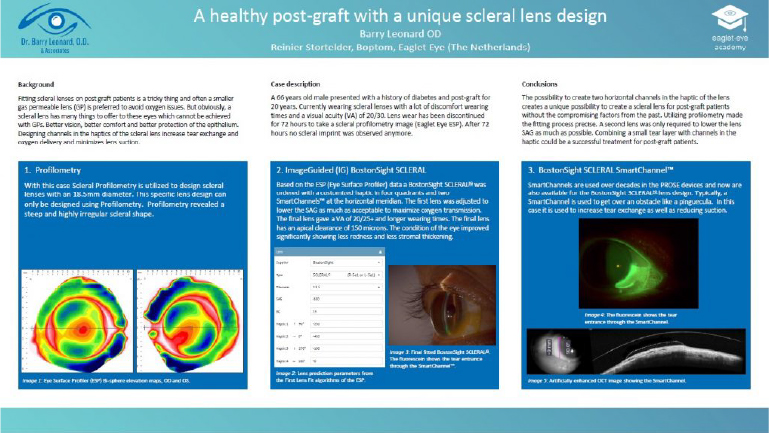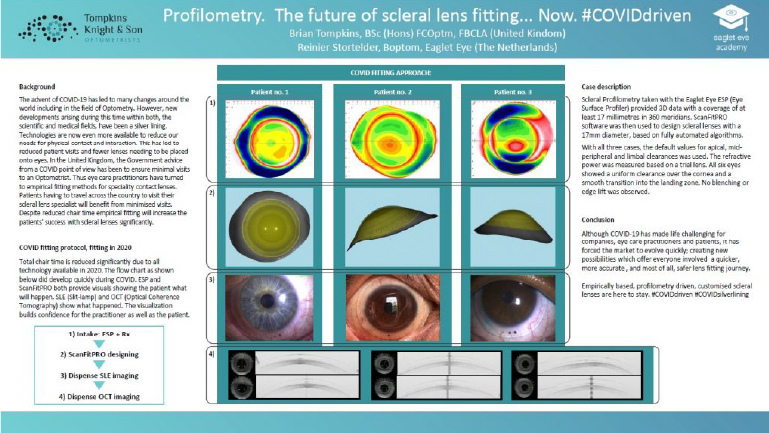Dive into real-life clinical cases fitted with the ESP for deeper understanding.
ACADEMY
Posters
Two curves are better than one: Management of post-refractive myopia
Two curves are better than one: Management of post-refractive myopia
Sheila Morrison, OD, MSc, FAAO, FSLS, Alia Cappellani, OD, FAAO, FSLS, Dipl. ABO; Vanessa Lin, OD; Andrea Lasby, OD, FAAO, FSLS
This novel custom soft, oblate, dual base curve lens design was effective for several post-refractive contact lens fittings. Further study will be needed to elucidate impact of other lens fitting parameters used in conjunction with custom-soft dual base curve designs.
View Poster >>
OC-SAG Values in 360 Degrees
OC-SAG Values in 360 Degrees
Javier Rojas, Eef van der Worp, David Piñero
When looking at the anterior ocular surface in a 360-fashion – this study found that there are marked differences in OC-SAG values in different meridians.
View Poster >>
Elevating to the next level: A case series of dual sag scleral lens
Elevating to the next level: A case series of dual sag scleral lens
Alia Cappellani, OD, FAAO, FSLS, Dipl. ABO; Sheila Morrison, OD, MS, FAAO, FSLS; Andrea Lasby, OD, FAAO, FSLS; Vanessa Lin, OD
Digital design is the way of the present and future, though currently trial lens fitting with dual sagittal height designs is relevant and useful in clinical practice and often necessary for power.
View Poster >>
Peripheral corneal data is highly relevant
Peripheral corneal data is highly relevant
Dr Rolando Ortiz, OD; Reinier Stortelder, BOptom ; Karin Brown Balvert, FBDO CL
Using real elevation data of the peripheral cornea can reduce the number of refits for the Paragon CRT orthokeratology lens and the chair time. This study could be repeated with larger sample sizes and involving multiple fitters to minimize fitter bias.
View Poster >>
Precise Empirical Scleral contact lens fitting designing utilizing Profilometry
Precise Empirical Scleral contact lens fitting designing utilizing Profilometry
Kyriakos Telamitsi, BSc (Optics), Optometry, Contact Lenses Practitioner, FSLS, ISCLS
Thanks to the accurate scleral data Profilometry assists designing empirical freeform scleral contact lenses fitting precisely and it may help to reduce chair time and refits, leading to happy patients.
View Poster >>
Visual Rehabilitation with scleral lens in a patient with corneal scarring and pinguecula
Visual Rehabilitation with scleral lens in a patient with corneal scarring and pinguecula
Karin Brown Balvert, FBDO CL, MBCLA; Joana Marta, Orthoptist, Contact Lens Specialist
With larger diameter scleral lenses, pingueculas can be hard to fit, but with the improving technology in the labs, and accurate measurements of the scleral surface, it was possible to get a good fitting lens.
View Poster >>
Profilometry Precision: A Scleral Lens Fit Utilizing Profilometry
Profilometry Precision: A Scleral Lens Fit Utilizing Profilometry
Melanie Mae Patterson, Rebecca Simmons Brown, Samantha Myers (OD , FAAO), Renee Reeder (OD, FAAO , FBCLA , FSLS , FIACLE)
Scleral lenses are a great option for patients with ocular surface disease. A near perfect fit is often required in these patients in order to improve comfort and increase wear time.
View Poster >>
Comparison of sagittal height measurements with Fourier domain profilometry and with narrow cone corneal topographer
Comparison of sagittal height measurements with Fourier domain profilometry and with narrow cone corneal topographer
Javier Sebastián, GOO, MSc; Razvan Ghinea, PhD; David Piñero, PhD; Javier Rojas, MSc, FAAO; Julio Ezpeleta, GOO, MSc.
Values provided by both devices are no interchangeable and clinical significant differences were observed.
View Poster >>
Corneoscleral junction angle in healthy eyes assessed objectively
Corneoscleral junction angle in healthy eyes assessed objectively
Javier Rojas, MSc, FAAO; David Piñero, PhD; Javier Sebastián, GOO, MSc; Julio Ezpeleta, GOO, MSc; Alejandra Consejo, PhD.
The corneoscleral junction angle influences sagittal height, a key parameter for ensuring a successful lens fit, especially in large-diameter lenses.
View Poster >>
A theoretical approach to estimate the impact of the corneo-scleral junction angle on ocular sagittal height
A theoretical approach to estimate the impact of the corneo-scleral junction angle on ocular sagittal height
Reinier Stortelder, BOptom; Javier Rojas GOO, MSc, FAAO; David P. Piñero, PhD
A theoretical model was created to calculate the tangent angle at the end of an asphere of 12 mm.
View Poster >>
The Need for Speed
The Need for Speed
John Samssedi, OD, FAAO; Brian Tompkins, BSc (Hons), FCOptom, FBCLA
Both nystagmus patients showed toricity with the rule and the toricity increases as the chord length increases. As a result, the scleral lens approach for both these patients was the best approach.
View Poster >>
Incorporating a Bi-Elevation Design for Improved Scleral Lens Centration
Incorporating a Bi-Elevation Design for Improved Scleral Lens Centration
Germán Aparicio, OD; Lindsay A. Sicks, OD, FAAO, FIACLE, FSLS
Scleral lens centration is influenced by several factors including the corneal sagittal height, limbal shape, and scleral shape. All these factors can be assessed using corneal and scleral Profilometry.
View Poster >>
Nomograms to use with Scleral Profilometry
Nomograms to use with Scleral Profilometry
Reinier Stortelder, BOptom
Scleral lens designs are currently updated rapidly offering more features, more parameters and finally more comfort to the patient. In this poster two guidelines are suggested to make it easier to combine Profilometry for scleral lens designing.
View Poster >>
HVID Measurements Utilizing Various Instrumentation
HVID Measurements Utilizing Various Instrumentation
Jennifer Harthan OD, FAAO, FSLS; William Skoog; Xiaohua Zhuang, PhD, FAAO; Louise Sclafani OD, FAAO, FSLS
Horizonal Visible Iris Diameter and sagittal depth measurements are important when fitting specialty lenses as they assist with initial lens selection and can improve comfort and fit. The purpose of this study was to determine HVID measurements provided by different instruments.
View Poster >>
Optimizing Soft Lens Fitting: Importance of HVID Versus Corneal Curvature
Optimizing Soft Lens Fitting: Importance of HVID Versus Corneal Curvature
Jason Jedlicka OD, FAAO; Joselyn Dlouhy, OD
In an effort to optimize soft contact lens fitting, we sought to determine which is the more valuable data parameter when selecting an initial lens, corneal curvature or corneal diameter, and the significance or impact of each.
View Poster >>
Not Just SAG, a Theoretical Model to Compare the SAG of Soft Lenses
Not Just SAG, a Theoretical Model to Compare the SAG of Soft Lenses
Reinier Stortelder, BOptom; Giancarlo Montani OD, FIACLE, FBCLA; Javier Rojas OD, FAAO, FSLS
Over the last decade the soft lens market has learned that the dropout rate is not improving. The existing method of fitting soft lenses, based on the keratometry values of the eye and BC of the lens does not work. An easy-to-use calculation method is introduced.
View Poster >>
Considerations when comparing scleral shape differences
Considerations when comparing scleral shape differences
Reinier Stortelder, BOptom
Corneal difference maps are a popular method to track and trace the development of corneal diseases as well as the condition of the cornea post operative. In this poster a couple of considerations are discussed when comparing sagittal height (SAG) maps.
View Poster >>
A healthy post-graft with a unique scleral lens design
A healthy post-graft with a unique scleral lens design
Barry Leonard OD; Reinier Stortelder, BOptom
Fitting scleral lenses on post graft patients is a tricky thing and often a smaller gas permeable lens is preferred to avoid oxygen issues. But obviously, a scleral lens has many things to offer to these eyes.
View Poster >>
Profilometry: The future of scleral lens fitting NOW #COVIDdriven
Profilometry: The future of scleral lens fitting NOW #COVIDdriven
Brian Tompkins, BSc (Hons) FCOptm, FBCLA; Reinier Stortelder, BOptom
The advent of COVID-19 has led to many changes around the world including in the field of Optometry. However, new developments arising during this time within both, the scientific and medical fields, have been a silver lining.
View Poster >>
Revolutionize your patient’s eyecare experience
This next generation topographer allows a notable reduction in chair time and number of refits, making the process more efficient and comfortable for your patients.

Book a demo of the
Eye Surface Profiler
To find out more about the most comprehensive contact lens fit


